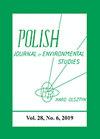Analysis of the Behavioral Intention and Influencing Factors of Farmers Replacing Coal with Electricity in the Context of Carbon Neutrality: the Case Study in Yulin City
IF 1.3
4区 环境科学与生态学
Q4 ENVIRONMENTAL SCIENCES
引用次数: 0
Abstract
Exploring the formation mechanism of farmers’ behavioral intention to adopt electricity to replace coal (INT-CE) is important for adjusting energy policies in the context of passive energy transition. Based on the integrated framework of Theory of Planned Behavior (TPB) and Normative Activation Model (NAM), taking farmers in Yulin City, Shaanxi Province as the research sample, the formation mechanism of INT-CE is empirically analyzed using partial least squares structural equation modeling (PLS-SEM). INT-CE was influenced by both self-interested and altruistic motives, with self-interested motives having a greater impact. The results show that: (1) Subjective attitudes and perceived behavior control have significant positive effects on low-income farmers' transformation intention, the influence coefficients are 0.170 and 0.331, respectively. (2) Perceived behavior control has a significant positive impact on the transition intention of middle - income farmers, the coefficient is 0.155. (3) Subjective norms have significant positive impacts on the energy transition intention of high-income farmers, the coefficient is 0.261. Attitude has the greatest influence on INT-CE. The effect of past habits on INT-CE was not significant, but was controlled by attitudes and perceptual behaviors. Outcome awareness and responsibility attribution indirectly enhance INT-CE through personal norms. The government should consider farmers' self-interest and altruistic motives when motivating INT-CE. On the one hand, positive concepts of energy conservation should be fostered and farmers' knowledge of energy conservation should be enhanced. On the other hand, the education of farmers should be strengthened to make them realize the ecological damage caused by non-clean energy. At the same time, the influence of relevant groups on INT-CE should be further emphasized to play the role of demonstration and leadership,碳中和背景下农民 "以电代煤 "的行为意向及影响因素分析--以榆林市为例
探索农民 "以电代煤(INT-CE)"行为意向的形成机制,对于能源被动转型背景下的能源政策调整具有重要意义。基于计划行为理论(TPB)和规范激活模型(NAM)的综合框架,以陕西省榆林市农民为研究样本,采用偏最小二乘结构方程模型(PLS-SEM)对INT-CE的形成机制进行了实证分析。INT-CE受利己和利他两种动机的影响,其中利己动机的影响更大。结果表明(1)主观态度和感知行为控制对低收入农户的转型意向有显著的正向影响,影响系数分别为 0.170 和 0.331。(2)感知行为控制对中等收入农户的转型意向有显著的正向影响,影响系数为 0.155。(3)主观规范对高收入农户的能源转型意向有显著的正向影响,系数为 0.261。态度对 INT-CE 的影响最大。过去习惯对 INT-CE 的影响不显著,但受态度和感知行为的控制。结果意识和责任归因通过个人规范间接增强了 INT-CE。政府在激励 INT-CE 时应考虑农民的自利和利他动机。一方面,应培养积极的节能观念,增强农民的节能知识。另一方面,应加强对农民的教育,使他们认识到非清洁能源对生态环境的破坏。同时,应进一步重视相关团体对 INT-CE 的影响,发挥其示范和引领作用、
本文章由计算机程序翻译,如有差异,请以英文原文为准。
求助全文
约1分钟内获得全文
求助全文
来源期刊

Polish Journal of Environmental Studies
环境科学-环境科学
CiteScore
3.10
自引率
11.10%
发文量
430
审稿时长
4 months
期刊介绍:
One of the most important challenges facing the contemporary scientific world are problems connected with environmental protection. Intensive development of industry and agriculture has led to a rise in living standards on one hand, but an increase in environmental degradation on the other. This degradation poses a direct threat to human health and life. Solving these ever-increasing problems which seriously endanger our civilization require the united efforts of scientists and field researchers of many branches.
The "Polish Journal of Environmental Studies" publishes original papers and critical reviews on the following subjects:
-Basic and applied environmental pollution research, including environmental engineering
-Pollution control of atmospheric, water (marine and fresh), soil and biological materials
-Determination of harmful substances, including their metabolic breakdown patterns
-Analytical methods for metabolic breakdown patterns or other chemical degradation patterns in the environment and in biological samples
-Development of new analytical methods, instruments and techniques for controlling pollutants
-Circulation of pollutants in the environment and their effect on living organisms
-Environmentally oriented catalysis
-Hazards to human health and safety
-Waste utilization and management
-Land reclamation
-Conference reports, scientific and technical reports and book reviews
 求助内容:
求助内容: 应助结果提醒方式:
应助结果提醒方式:


